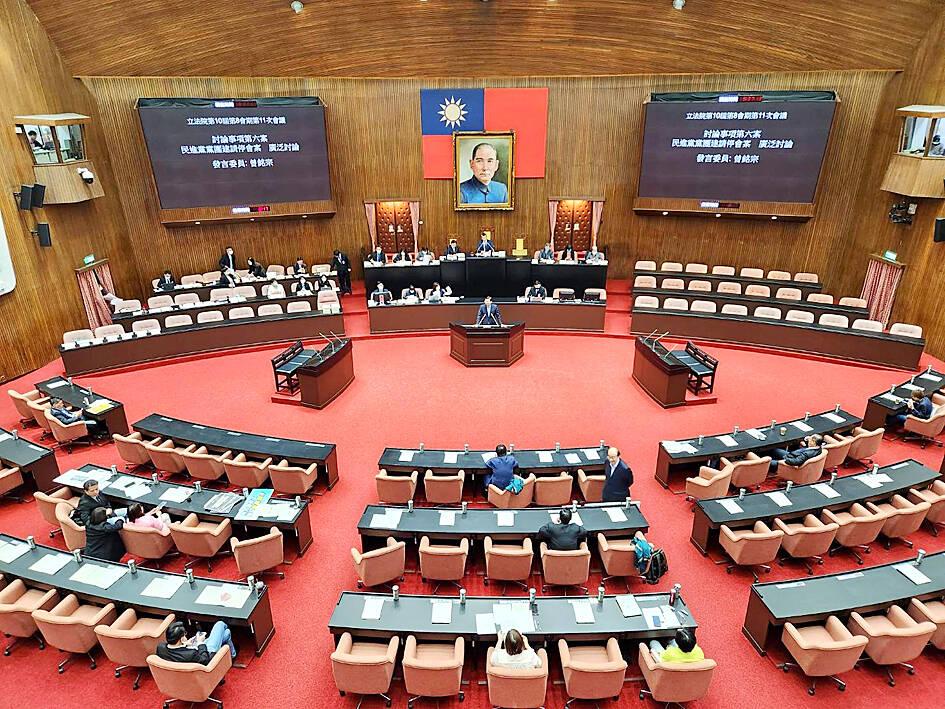The Legislative Yuan held extensive discussions today on an April 18 proposal from the Chinese Nationalist Party (KMT) to extend the current legislative session for two months until July 31, leading to an exchange of sharp criticisms between both sides.
DPP caucus chief executive Rosalia Wu (吳思瑤) said “everyone knows” why the KMT is seeking to extend the session, given their fear of recalls which have targeted dozens of KMT legislators.
The DPP would support extending the session for bills that benefit the country and people’s livelihoods but not for the benefit of the KMT, Wu said.

Photo: Taipei Times file
While the country faces tariffs from the US and people hope for change, DPP lawmakers want to take vacations, KMT Legislator Wang Hung-wei (王鴻薇) countered today.
The DPP has yet to grant Taiwan's workers more holiday leave, yet wants to take a two-month vacation, Wang added.
This would be the longest extension in the history of the Legislative Yuan, DPP Legislator Wang Ting-yu (王定宇) said on Facebook.
While the Legislative Yuan is not in session, lawmakers continue to work, Wang Ting-yu said, such as studying bills, meeting their constituents and advocating for local development.
Lawmakers who only work when they are in session “have a very easy life,” Wang Ting-yu added.
The KMT proposal stems from the party’s fear of the recall movement and intention to shelter under the “protective umbrella” of the Legislative Yuan, DPP Legislator Jean Kuo (郭昱晴) said today on Facebook, asking which bills justify an extended session.
Furthermore, the Legislative Yuan can seek to call an extraordinary session rather than extend the current session for two more months, Kuo said.
Although the KMT has said that the extension is about discussing people’s livelihoods and responding to US tariffs, it is actually about legislators “hiding” behind judicial immunity and their involvement in criminal cases, Kuo said.
This move undermines people’s trust in the Legislative Yuan, Kuo added.
The government cannot be used as a tool for legislators and political parties to pursue their own interests, she said.
Taiwan People's Party Legislator Chang Chi-kai (張啓楷) accused DPP lawmakers of acting like “bandits,” blaming the party for delaying bills and carrying out the large-scale recall movement.

The Coast Guard Administration (CGA) yesterday said it had deployed patrol vessels to expel a China Coast Guard ship and a Chinese fishing boat near Pratas Island (Dongsha Island, 東沙群島) in the South China Sea. The China Coast Guard vessel was 28 nautical miles (52km) northeast of Pratas at 6:15am on Thursday, approaching the island’s restricted waters, which extend 24 nautical miles from its shoreline, the CGA’s Dongsha-Nansha Branch said in a statement. The Tainan, a 2,000-tonne cutter, was deployed by the CGA to shadow the Chinese ship, which left the area at 2:39pm on Friday, the statement said. At 6:31pm on Friday,

The Chinese People’s Liberation Army Navy’s (PLAN) third aircraft carrier, the Fujian, would pose a steep challenge to Taiwan’s ability to defend itself against a full-scale invasion, a defense expert said yesterday. Institute of National Defense and Security Research analyst Chieh Chung (揭仲) made the comment hours after the PLAN confirmed the carrier recently passed through the Taiwan Strait to conduct “scientific research tests and training missions” in the South China Sea. China has two carriers in operation — the Liaoning and the Shandong — with the Fujian undergoing sea trials. Although the PLAN needs time to train the Fujian’s air wing and

The American Institute in Taiwan (AIT) put Taiwan in danger, Ma Ying-jeou Foundation director Hsiao Hsu-tsen (蕭旭岑) said yesterday, hours after the de facto US embassy said that Beijing had misinterpreted World War II-era documents to isolate Taiwan. The AIT’s comments harmed the Republic of China’s (ROC) national interests and contradicted a part of the “six assurances” stipulating that the US would not change its official position on Taiwan’s sovereignty, Hsiao said. The “six assurances,” which were given by then-US president Ronald Reagan to Taiwan in 1982, say that Washington would not set a date for ending arm sales to Taiwan, consult

A Taiwanese academic yesterday said that Chinese Ambassador to Denmark Wang Xuefeng (王雪峰) disrespected Denmark and Japan when he earlier this year allegedly asked Japan’s embassy to make Taiwan’s representatives leave an event in Copenhagen. The Danish-language Berlingske on Sunday reported the incident in an article with the headline “The emperor’s birthday ended in drama in Copenhagen: More conflict may be on the way between Denmark and China.” It said that on Feb. 26, the Japanese embassy in Denmark held an event for Japanese Emperor Naruhito’s birthday, with about 200 guests in attendance, including representatives from Taiwan. After addressing the Japanese hosts, Wang